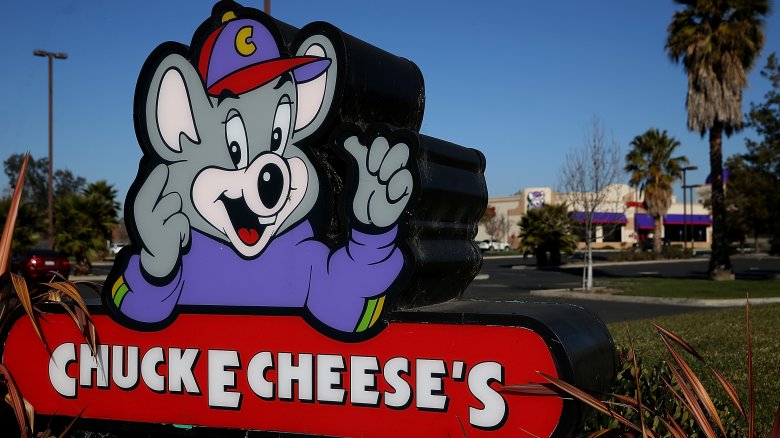The Story Behind Chuck E. Cheese's Mascot Is Actually Really Sad
When you think of Chuck E. Cheese's, what comes to mind? Super happy place? Or perhaps a bit creepy, or maybe even mildly terrifying (particularly if you're a Five Nights at Freddy's fan)? Yep, dubious pizza, singing rodents, and screaming kiddies can be a bit... overwhelming. One descriptor that probably does not come to mind, however, is heart-wrenching pathos — and yet, if you dig into the backstory of the restaurant's namesake mascot, that is exactly what you'll find (via People).
This surprisingly tragic tale, as published in an ebook for kids available on the company's own website, begins at an orphanage called St. Marinara's (a saint whose feast day is undoubtedly January 4, aka National Spaghetti Day). Chuck E., himself an orphan, moved there to live amongst his fellow (human) orphans, who were evidently so used to living in rodent-infested squalor that they didn't have any problem including a rat in all their little orphan games. But wait — it gets sadder. Chuck E., being an orphan, never knew his own birthday, but somehow all of the human orphans knew theirs, so there were parties at the orphanage almost every week. These parties were where Chuck E. came to love mediocre pizza, and where he also learned to sing his favorite song, "Happy Birthday."
Besides pizza, orphans, and birthdays, Chuck E. had one more grand passion in his life — video games, or at least what passed for these back in the '70s. In fact, it was his big win in a Pong tournament, along with the grand prize of $50, that allowed Chuck E. to hop a bus for New York. It was there that things promptly went from depressing to downright dangerous, as he was chased around a pizzeria by a homicidal, rolling pin-wielding chef.
Chuck E. was able to wangle a reprieve from death by kitchen implement by bursting into song, as one does in the face of imminent bludgeoning. At this point, his would-be murderer-turned-new BFF Pasqually decided to exploit Chuck E. for his own personal gain. He set the mouse up with a singing gig, but Chuck E. promptly botched it due to an ill-timed bout of stage fright.
The happy ending after all this Dickensian bleakness finally came when Chuck E. and Pasqually realized that kids have much lower standards than adults do, for music as well as for pizza. From henceforth, Chuck E. and Pasqually would save their culinary and entertainment efforts for the least discriminating of audiences, and thus was their kiddie party empire born.
